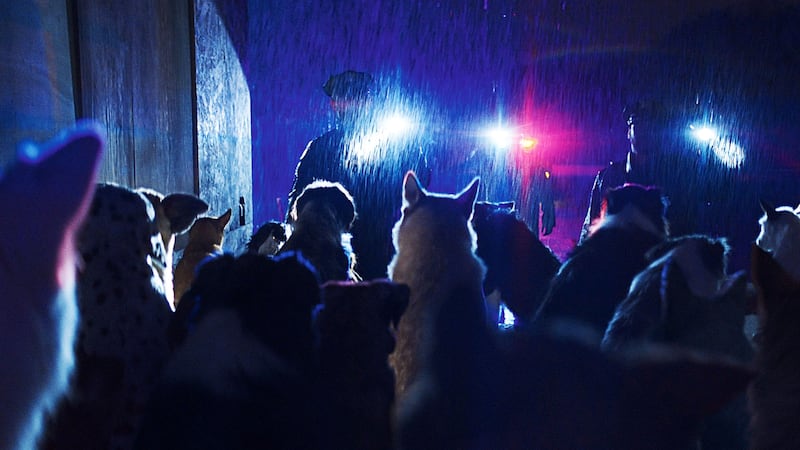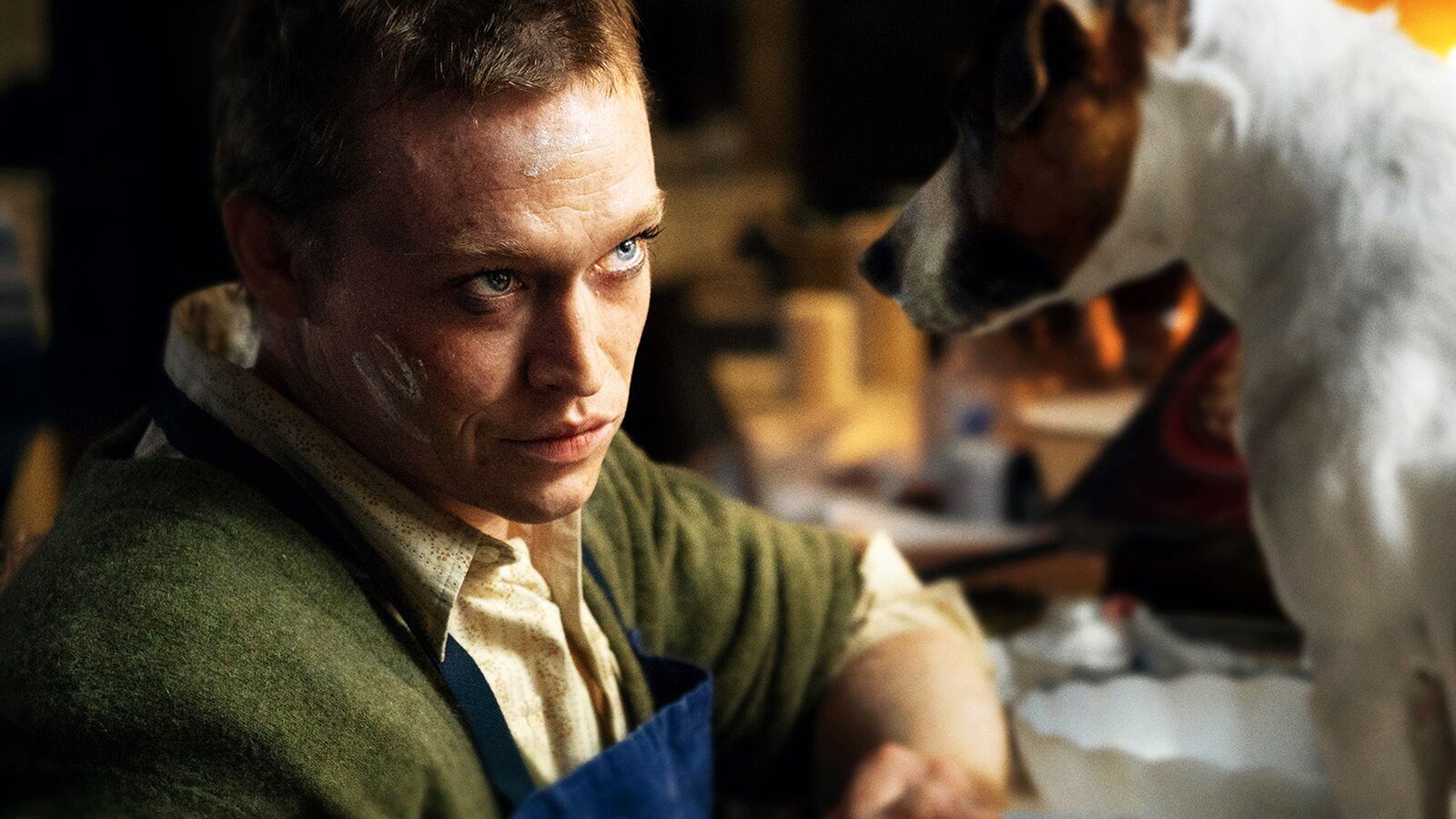Dogman is Joker by way of Robin Hood, Air Bud, and RuPaul's Drag Race, and arguably the most absurd film of this, or any recent, year. Whether it’s offensive is also certainly up for debate. Yet the prime calling card of The Fifth Element director Luc Besson’s latest, which premieres March 29 in theaters following its debut at last year’s Venice International Film Festival, is its unabashed and laugh-out-loud goofiness, which is amplified by the seriousness with which it takes itself. Part superhero villain origin story, part religiously minded character study, and part The Professional-esque action thriller, it appears destined for the unintentional comedy hall of fame.
On a rainy highway near Trenton, New Jersey, a truck is forced to stop at a police checkpoint. In the driver’s seat, an officer discovers Douglas (Caleb Landry Jones), a man who’s dolled up like Marilyn Monroe in her “Diamonds Are a Girl’s Best Friend” outfit, complete with a pink dress and matching sleeves, sparkling jewelry around his neck and wrists, and a platinum blonde wig atop his head. This naturally surprises the cop, as does Douglas’ cargo: an enormous pack of dogs, who “won’t hurt you so long as you don’t hurt me.” Taking his advice, law enforcement chooses to simply arrest the mystery man, and at a detention center, he’s questioned by Dr. Evelyn Decker (Jojo T. Gibbs), a thoroughly bland psychiatrist and single mother who’s presently dealing with an out-of-control ex.
Douglas has bandaged wounds on his back and his brow, and in his first sit-down with Evelyn, he discusses his fondness for disguises (which fostered his process of “becoming” someone else), his love of dogs (“my babies”), and his canine friends’ sole flaw (“they trust humans”). There isn’t a line spoken during this exchange that doesn’t sound written—and tailor-made for a theatrical trailer—and that phoniness infects the remainder of Besson’s original script. In the duo’s ensuing conversations, Douglas recounts his path to this present moment with a smirking, eye-twinkling smugness that’s meant to be at once charmingly playful and imposingly (if not dementedly) confident.
While Jones has a history of dialing things up to 11, he lets loose like never before in Dogman, delivering a raft of quasi-feminine affectations (be it eye rolls, hand gestures, or soft vocal intonations) that are exacerbated by his Joker-ish complexion (pale skin contrasted with cropped red hair) and his physical disability, since chain-smoking Douglas is generally confined to a wheelchair and can only temporarily walk courtesy of Forrest Gump-style leg braces.

Dogman is allergic to subtlety, and if that isn’t apparent from its initial dialogue, it’s made abundantly clear by its flashbacks to teen Douglas’ (Lincoln Powell) upbringing with a monstrous father who earned a living via dog fighting, and who—upon discovering that his son was sneaking the abused pooches food from the dinner table—permanently locked his son in the dogs’ cage.
“This is your family now!” screams Douglas’ dad, and yet they quickly become something even more than that, given that Douglas and his dogs share love as well as a means of intelligently communicating with each other. Douglas’ psycho brother rants at him about Jesus and salvation while hanging a banner outside his cage that reads “In the Name of God,” and because he’s on the other side of it, Douglas reads “God” as “Dog”—a conflation that Besson treats with a gravity that inspires disbelieving chuckles.
During his imprisonment, Douglas discovers a stack of his “weak” mom’s ladies’ magazines, and his feminization continues when—after being shot by his dad (thus crippling him) and successfully ordering his dogs to track down the police—he’s sent to a boarding school where he flourishes under the guidance of drama teacher Salma (Grace Palma), who has him play every role in the Shakespearean canon. Though his creepy stalker love for Salma goes unrequited, the adult Douglas finds a new home, and calling, at a Jersey drag cabaret where he becomes an instant star by performing as Edith Piaf. This showstopper, as well as everything else about Dogman, is staged and shot with maximum over-the-top flair, and the incongruity of Besson’s blockbuster aesthetics and tone, and the sheer silliness of the action at hand, is so profound that it’s difficult to comprehend how no one noticed, in real time, what a fiasco they were fashioning.
Dogman never stops with the lunacy, so Douglas is soon shacking up in an abandoned school that he outfits with an assortment of clever booby traps and where he perpetually sits at a makeshift vanity (modeled distinctively after Joker) donning his make-up as his dogs patiently sit by his side awaiting his next command, such as fetching ingredients for a cake (because, you see, his mom also loved to cook). By day, he works as a de facto savior for the powerless, as when he employs his pets to menace a scary Latino gang. At night, he sends his companions out on covert missions to rob the wealthy, which he validates to Evelyn by stating, “I believe in the redistribution of wealth.” On and on the inanity goes, with Douglas using his dogs to protect the innocent, punish the wicked (like his brother), and bring about some sort of (preposterous, and hypocritical) justice for the marginalized and downtrodden.
Late conflicts with both an insurance agent (Christopher Denham) who’s on to his illicit enterprise (“This is the work of an artist,” he marvels) and the aforementioned Hispanic baddies allow for much talk about right and wrong, God and the Devil. And to its credit, Dogman makes it all equally, deliriously daft. "Dog eat dog—it's just a simple law of nature, isn't it?" remarks Douglas as his canines feast upon a victim, and by the time he’s breaking out of jail thanks to Beethoven-grade hijinks and emerging from the station in a knock-off Clown Prince of Crime tuxedo, the film has devolved into abject ridiculousness. It’s as big a swing as any in Besson’s career, and consequently, when it wholly and embarrassingly misses, the blow back is borderline overpowering.






